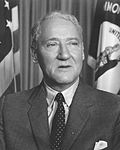| |||||||||||||||||
| |||||||||||||||||
 County results Cooper: 50-60% 60-70% 70-80% 80–90% >90% Johnson: 50–60% 60–70% | |||||||||||||||||
| |||||||||||||||||
| Elections in Kentucky |
|---|
 |
The 1960 United States Senate election in Kentucky took place on November 6, 1960. Incumbent Republican Senator John Sherman Cooper, who won a 1956 special election to fill the vacant seat of Alben Barkley, [a] was elected to a full term in office, defeating Democratic former Governor and Undersecretary of Labor Keen Johnson.
Contents
- Democratic primary
- Candidates
- Results
- Republican primary
- Candidates 2
- Results 2
- General election
- Results 3
- See also
- Notes
- References
This marked the first time that Republicans won consecutive Senate elections in the state.


